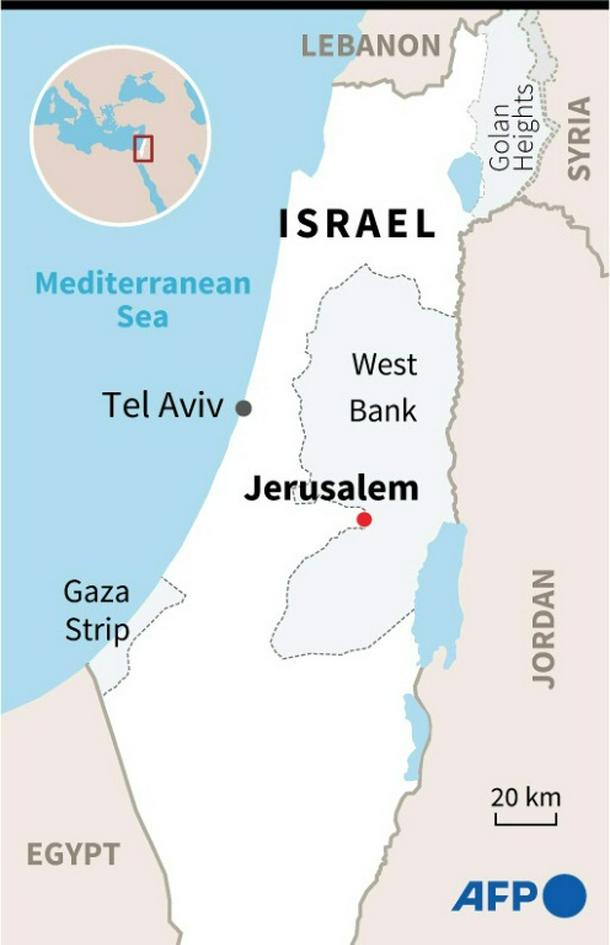
An Israeli forensic scientist inspects the inside of a bus damaged in one of the twin blasts that hit Jerusalem early Wednesday
Jerusalem (AFP) - An Israeli-Canadian teen was killed and 14 people were wounded Wednesday as the first bombings in Jerusalem in years hit two bus stops, with Palestinian militant group Hamas cheering the unclaimed attacks.
A search was underway for suspects who targeted an area frequented by ultra-Orthodox Jews at the city’s western exit, as violence in the Israeli-Palestinian conflict flares and while Israeli politicians discuss the make-up of a coalition government.
Israeli police described the blasts as “a combined terror attack” and said explosive charges were planted at the two bus stops.
The first blast killed one teenager and wounded 11 other people, before a second injured three at a stop nearby, hospitals treating the casualties said.

Map locating Jerusalem where multiple people were wounded in two separate explosions targeting bus stations on Wednesday.
The prime minister’s office identified the boy killed as 15-year-old Aryeh Schupak, who Canada said was one of its citizens.
Canadian Prime Minister Justin Trudeau said he was “saddened” by the killing and condemned the violence “in the strongest possible terms”.
The Shin Bet domestic security agency told AFP the blasts were the first in Jerusalem since 2016, and said 34 bombings had been thwarted this year.
- Coalition talks -
An AFP photographer said the first blast had ripped a hole through a metal fence behind the bus stop.

The bombs struck two bus stations a short distance apart on the outskirts of Jerusalem
Police said the second explosion struck half an hour later, tearing through the side of a bus.
The bus driver said the stop was “very full” when the blast hit.
“As I was leaving it, I heard a loud explosion. I opened the doors, people ran out,” Motty Gabai told army radio.
A security source told AFP the bombs were detonated remotely.
Hundreds of mourners including senior politicians gathered later Wednesday for Schupak’s funeral in Jerusalem.
Rabbi Akiva Orlanski, who taught the boy, said Schupak was the “heart” of the religious school and “wanted to come closer to God”.
Palestinian militant group Hamas, which controls the Gaza Strip, praised the bombings.
“We congratulate our Palestinian people and our people in the occupied city of Jerusalem on the heroic special operation at the bus stop,” Hamas spokesman Abd al-Latif al-Qanua said.
The attacks hit amid talks on the make-up of a coalition government being formed by prime minister-designate Benjamin Netanyahu, a veteran hawk.
Outgoing premier Yair Lapid briefed Netanyahu following a meeting with security chiefs.
“We must form a government as soon as possible,” said extreme-right lawmaker Itamar Ben-Gvir, a key ally in the proposed alliance.
“The terror is not waiting,” he added as he visited the scene of the blasts.
- West Bank violence -
Secretary of State Antony Blinken said the United States “stands resolutely with the people of Israel in the face of the terrorist attacks”.
“Our commitment to Israel’s security remains ironclad,” he said in a statement.
During the second intifada, or uprising, in the early 2000s, Palestinian militants repeatedly planted bombs at urban bus stops, including in Jerusalem.

The area targeted by the twin bombings, which security sources said were the first in Jerusalem since 2016, is frequented by ultra-Orthodox Jews
Violence has flared in recent months, particularly in the occupied West Bank, where Israeli forces have launched often deadly raids following a series of fatal attacks on Israeli targets.
Tensions were running high Wednesday in the flashpoint West Bank city of Jenin, where Lapid said an Israeli critically wounded in a car crash a day earlier was abducted and subsequently died.
The Israeli military said it had shut two checkpoints in the area.
Hossam Fero, the father of the Israeli Druze teenager, said Palestinian militants “kidnapped” his son from hospital.
“When I saw him he was breathing, they disconnected him from the machines and kidnapped him,” Fero told Ynet radio.
Israelis abducted dead or alive have been used in the past as bargaining chips by Palestinian militant groups to secure the release of prisoners or the return of bodies of Palestinians killed in clashes by Israel.
Also Wednesday, 22-year-old Palestinian Hisham Abu Kishek died of his wounds following clashes late the previous day with Israeli forces in the West Bank city of Nablus, the Palestinian health ministry said.
Earlier in the day, a funeral was held for Ahmed Amjad Shehadeh, a 16-year-old boy who was killed in the same clashes.
“This occupation (Israel) doesn’t have mercy for the old or the young, everyone’s a target,” his father, Ahmed Shehadeh, said.